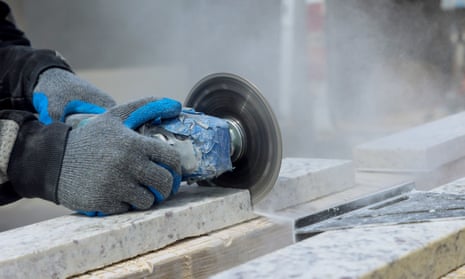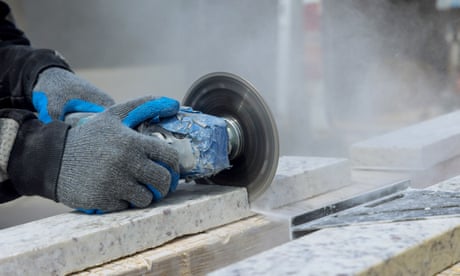Extract from The Guardian

Employment minister Tony Burke says a Safe Work Australia report has come back with a ‘very strong recommendation in favour of a ban’ on engineered stone benches.
Tony Burke says governments should act ‘as soon as possible for people to be safe’
Fri 27 Oct 2023 16.04 AEDT
First published on Fri 27 Oct 2023 11.35 AEDTThe report by Safe Work Australia was released after state and federal workplace safety ministers met on Friday to discuss the future of the material.
A national response to the “powerful and compelling” report was being worked on by governments, the federal workplace relations minister, Tony Burke, said after the meeting.
“We will convene another meeting of work health and safety ministers this year to decide on next steps,” Burke said.
The Safe Work Australia report found there was “no evidence” that lower levels of crystalline silica could be safe for workers cutting and grinding engineered stone, commonly used in kitchens and bathroom benchtops.
“The only way to ensure that another generation of Australian workers do not contract silicosis from such work is to prohibit its use, regardless of its silica content,” the report says.
“The cost to industry, while real and relevant, cannot outweigh the significant costs to Australian workers, their families and the broader community that result from exposure to [respirable crystalline silica] RCS from engineered stone.”
Burke said the report showed “very clearly why we need further action to protect workers from this deadly disease”.
“No one should ever contract a terminal illness simply because they’ve turned up to work,” he said.
The Safe Work report said businesses, workers and regulators had all “failed to ensure the health and safety” of tradies handling engineered stone.
“There has been insufficient compliance and enforcement actions by [workplace health and safety] WHS regulators to drive behaviour change in the sector,” it said.
It also warned that permitting reduced silica content would not improve safety compliance.
“The features of the sector that have contributed to the current levels of non-compliance remain,” it said.
“In fact, permitting work with lower-silica engineered stone may encourage even greater non-compliance with WHS laws as there may be an incorrect perception that these products are ‘safer’.”
Safe Work also recommended implementing a licensing framework for businesses that undertake “certain work with engineered stone previously installed”.
According to the Cancer Council, about 587,000 Australian workers have been exposed to silica dust. It has been estimated that 5,800 of these workers will develop a lung cancer over the course of their life as a result of that exposure.
Roger Singh, a silica litigation specialist at Shine Lawyers, said engineered stone was “lethal”.
“There is no other product which contains that much silica,” he told the ABC. “This product is lethal, like a loaded gun.”
Earlier on Friday, Burke compared engineered stone to asbestos and said there were issues regarding the handling of the product that need to be examined in the years to come.
“Similar to asbestos … while it’s there – when it’s stable – it is not a risk [and] it’s not an immediate panic for people who have these in place,” he told ABC Radio National.
“The risk comes either at installation or at renovation or removal. And we will be dealing with this as a legacy product for decades to come.”
Many states have already acted to regulate the stone benchtop industry. Queensland and Western Australia have banned dry-cutting stone, while South Australia is considering a licensing scheme and a ban on high-silica products.
The New South Wales work health and safety minister, Sophie Cotsis, said: “The status quo cannot continue, and the [state] government is determined to lead in ensuring we continue to protect workers.”
“A nationally consistent ban on manufactured stone is the best way forward. Every person has the right to be safe at work. Silicosis is an awful, debilitating disease that is a life sentence for both the sufferer and their loved ones,” Cotsis said.
Victoria’s minister for WorkSafe, Danny Pearson, said the state supported a national ban, having previously introduced the “toughest regulations in the country”.
“Silicosis is a national tragedy and disgrace and that’s why we’ve led the way to protect workers in Victoria,” Pearson said.
A previous national taskforce on dust diseases recommended governments start considering a ban from July 2024.
But Singh said there was an urgent need to release the report and adopt its recommendations “without further delay”.
“By the middle of next year … it is too late, because every day and every hour that passes, more workers are being exposed,” he said.
“We have had thousands of diagnoses around the country. We have had deaths. I spoke to a client of mine last night, who as we speak is awaiting a double lung transport.”
The Australian Council of Trade Unions recently pledged to ensure a ban was in place by the middle of next year if a government prohibition was not in effect.
– With Tamsin Rose

No comments:
Post a Comment